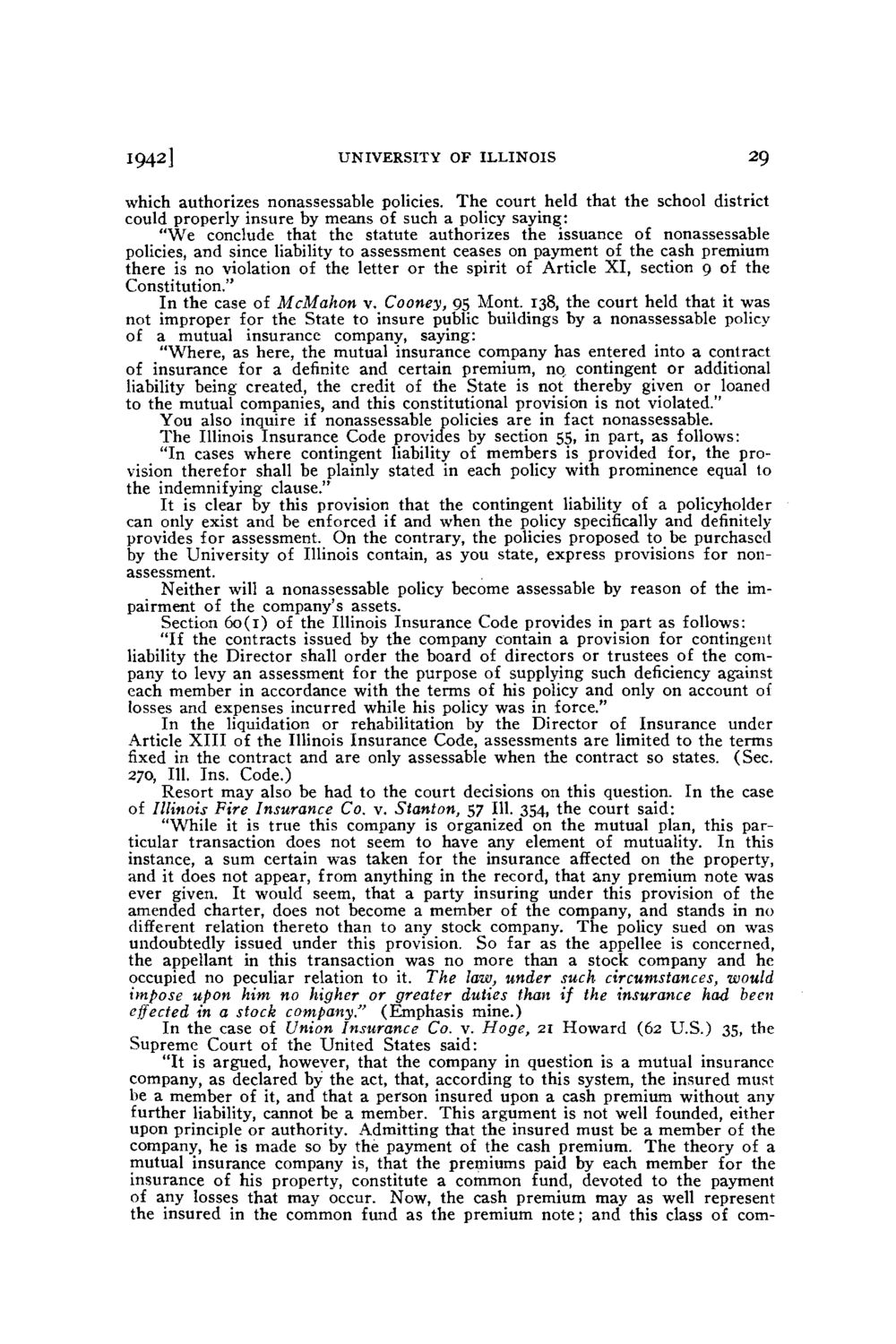| |
| |
Caption: Board of Trustees Minutes - 1944
This is a reduced-resolution page image for fast online browsing.

EXTRACTED TEXT FROM PAGE:
1942] UNIVERSITY OF ILLINOIS 29 which authorizes nonassessable policies. T h e court held that the school district could properly insure by means of such a policy saying: " W e conclude that the statute authorizes the issuance of nonassessable policies, and since liability to assessment ceases on payment of the cash premium there is no violation of the letter or the spirit of Article XI, section 9 of the Constitution." In the case of McMahon v. Cooney, 95 Mont. 138, the court held that it was not improper for the State to insure public buildings by a nonassessable policy of a mutual insurance company, saying: "Where, as here, the mutual insurance company has entered into a contract of insurance for a definite and certain premium, no contingent or additional liability being created, the credit of the State is not thereby given or loaned to the mutual companies, and this constitutional provision is not violated." You also inquire if nonassessable policies are in fact nonassessable. T h e Illinois Insurance Code provides by section 55, in part, as follows: "In cases where contingent liability of members is provided for, the provision therefor shall be plainly stated in each policy with prominence equal to the indemnifying clause." It is clear by this provision that the contingent liability of a policyholder can only exist and be enforced if and when the policy specifically and definitely provides for assessment. On the contrary, the policies proposed to be purchased by the University of Illinois contain, as you state, express provisions for nonassessment. Neither will a nonassessable policy become assessable by reason of the impairment of the company's assets. Section 60(1) of the Illinois Insurance Code provides in part as follows: "If the contracts issued by the company contain a provision for contingent liability the Director shall order the board of directors or trustees of the company to levy an assessment for the purpose of supplying such deficiency against each member in accordance with the terms of his policy and only on account of losses and expenses incurred while his policy was in force." In the liquidation or rehabilitation by the Director of Insurance under Article X I I I of the Illinois Insurance Code, assessments are limited to the terms fixed in the contract and are only assessable when the contract so states. (Sec. 270, 111. Ins. Code.) Resort may also be had to the court decisions on this question. In the case of Illinois Fire Insurance Co. v. Stanton, 57 111. 354, the court said: "While it is true this company is organized on the mutual plan, this particular transaction does not seem to have any element of mutuality. In this instance, a sum certain was taken for the insurance affected on the property, and it does not appear, from anything in the record, that any premium note was ever given. It would seem, that a party insuring under this provision of the amended charter, does not become a member of the company, and stands in no different relation thereto than to any stock company. T h e policy sued on was undoubtedly issued under this provision. So far as the appellee is concerned, the appellant in this transaction was no more than a stock company and he occupied no peculiar relation to it. The law, under such circumstances, would impose upon him no higher or greater duties than if the insurance had been effected in a stock company." (Emphasis mine.) In the case of Union Insurance Co. v. Hoge, 21 Howard (62 U.S.) 35, the Supreme Court of the United States said: "It is argued, however, that the company in question is a mutual insurance company, as declared by the act, that, according to this system, the insured must be a member of it, and that a person insured upon a cash premium without any further liability, cannot be a member. This argument is not well founded, either upon principle or authority. Admitting that the insured must be a member of the company, he is made so by the payment of the cash premium. T h e theory of a mutual insurance company is, that the premiums paid by each member for the insurance of his property, constitute a common fund, devoted to the payment of any losses that may occur. Now, the cash premium may as well represent the insured in the common fund as the premium note; and this class of com-
| |